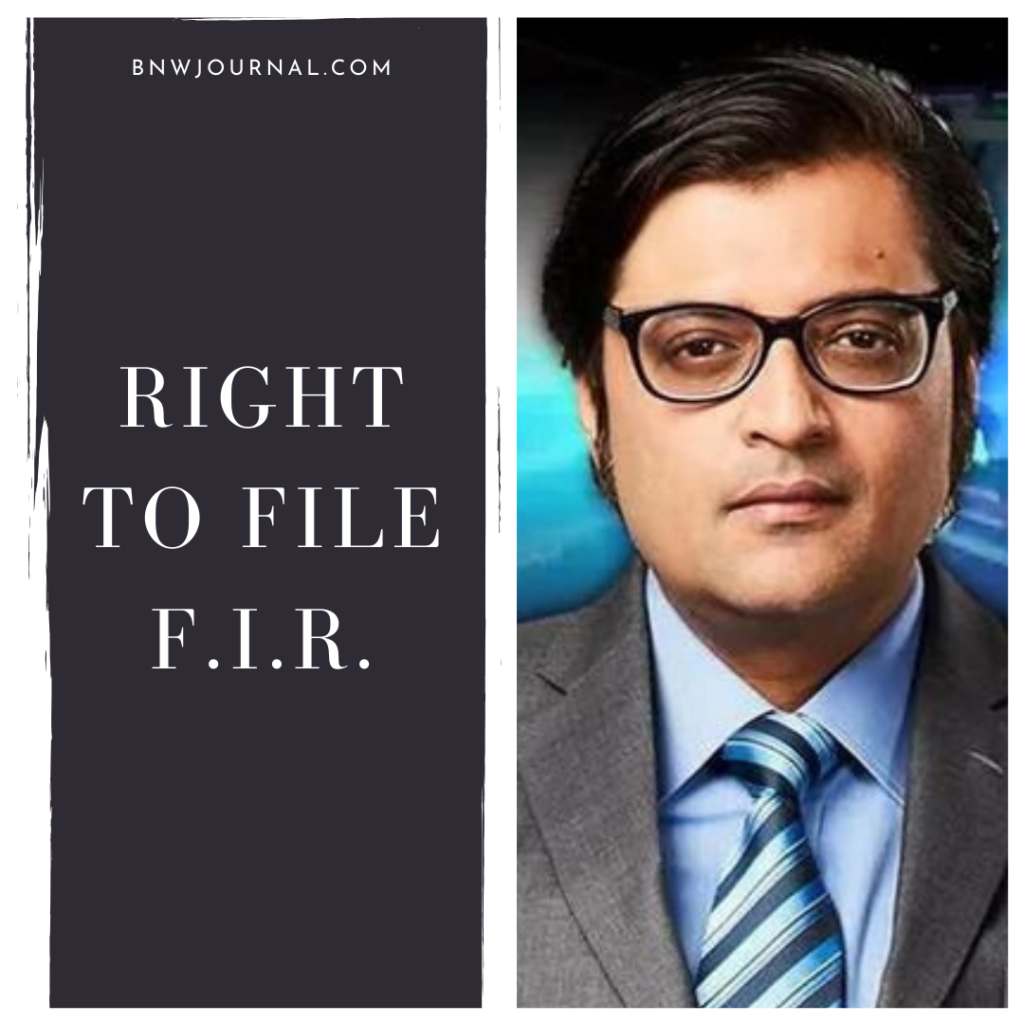![]()
The first right we have is the right to file a FIR. This right helps us to fight against crime or breach of our legal rights. Under the sovereignty of Indian Constitution, every individual has the right to report the crime which happens to him or which he witnesses. But in many cases we observe that the police refuse to register a FIR.

We have the proper rights to know, on which grounds the Police is refusing to register FIR. If Police refuses to register a FIR on unreasonable grounds, then we hold the right to make a complaint to a higher ranking officer. If they still refuse then making of a formal complaint is possible to our nearest judicial magistrate. Who will direct the police to register the FIR ,if necessary?
What is a FIR?
A first information report is the information police records immediately after the reporting of an offence. On the basis of this information, Police commences its investigation to the crime. Section 154 of CrPC, 1973 defines the first information report. The legislative spirit of S. 154 is available in the case of State Of Haryana And Ors vs Ch. Bhajan Lal And Ors[1].
“According to this case, S.154 (1) states that every information relating to “cognizable offence” if given orally or in writing to a police officer (within the meaning of 2(o)of the code) and signed by the informant should be entered in a such form by a police officer as the state govt. prescribed the form of “first information report” and such act of entering information in known as registration of a crime or a case.”
The police does not register a FIR in the very first; they register a complaint on the basis of offence committed.
Offences are generally divisible into two categories: “cognizable” and “non-cognizable” offences. FIR is lodged only in the matters of cognizable offences. In case of non-cognizable offences, a complaint is submitted to the magistrate, who afterwards directs the Police to take action accordingly.
If, even after the submission of a complaint to the higher Police officials, there is no lodging of a FIR, then the informant can legally submit the complaint to the nearest magistrate under Section 156(3) read with Section 190 of Cr.P.C.; then the magistrate directs the police to lodge FIR on behalf of the informant if necessary.
Who can file an FIR?
An informant may be the victim to the crime, a witness or any other person with knowledge of crime. Only an informant can file the FIR.
Hon’ble Supreme Court of India holds that, “To lodge an FIR there should be an informant to take responsibility of information provided, a vague or unauthorised information cannot be considered as first information even if it was received first at a time”. This is the reason why the informant signs the information ; to discourage him from making an irresponsible statement on an innocent victim.
If the informant refuses to sign the FIR against the crime, then he is punishable under the Section 180 of the IPC. But the absence of sign on the FIR does not render the complaint null or void. The FIR is still valid in the court as evidence to the investigation. In case of a cognizable offence, the police may directly register a FIR; but just a message or unknown phone call about the crime does not amount to first information report.
Police refused to mention facts reported by Editor-in-chief of Republic TV Arnab Goswami. Was this act the violation of rights of the victim?
An FIR was registered at the mid-night, on April 23 at NM Joshi Marg police station under Sec 341 (punishment for wrongful restrain) and 504 (intentional insult to provoke breach of the peace) of IPC by Arnab Goswami. As they drove back home from their studios Goswami and his wife got attacked by 2 people.
He alleged those two as Congress Party workers and attacked him on the order of their superiors. He publicly accused Sonia Gandhi for this act- calling her coward on the internet.
According to Arnab Goswami, DCP Abhinash Kumar backed off when he asked him to add ‘youth congress‘ in the complaint. Kumar said he would investigate to find out whether the congress party is behind this attack or not.
In case of Lallan Chaudhary v. State of Bihar[2], Hon’ble supreme court held that,
The genuineness or credibility of the information is not to consider being a condition precedent for registration of a case.
Facts of the crime or offence are not the grounds for denial to register a case. A police officer cannot demand to change the facts in a report. If the victim is complaining for any offence, he has all rights to name suspects. The signature is sufficient to claim that he is not lying about the facts; and afterwards, it’s the duty of the police to investigate on the basis of facts in the report.
Senior advocate Mukul Rohatgi represented Goswami in the court where the Justice D.Y. Chandrachud and M.R. Shah heard the case through video conferencing. Goswami appeared in court appealing to stay all FIRs against him. His advocate argued that the anchor works in public interest.
He also raised the issue of “murderous attack” on the client and his wife; hence claiming that the FIRs and attack together are “attempts to muzzle free speech.”
So that after hearing of Arnab Goswami, Supreme Court stayed all the FIRs against the Arnab except one FIR from Nagpur on behalf of congress leader Nitin Raut. Supreme Court also relieved him and gave him three weeks of protection from arrest. At last, I expect that a fair decision will be passed by the Hon’ble Supreme Court.
[1] 1992 AIR 604, 1990 SCR Supl. (3) 259
[2] Appeal (crl.) 1047 of 2006



1 Comment
RISHAV SONI · 03/05/2020 at 9:05 PM
Good work! Keep it up